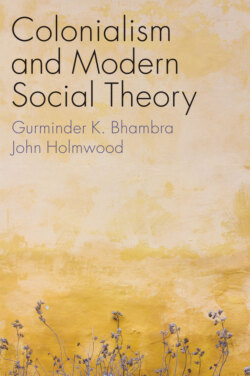Colonialism and Modern Social Theory

Реклама. ООО «ЛитРес», ИНН: 7719571260.
Оглавление
Gurminder K. Bhambra. Colonialism and Modern Social Theory
Table of Contents
Guide
Pages
Dedication
Colonialism and Modern Social Theory
Copyright Page
Preface and Acknowledgements
Introduction Colonialism, Historiography, and Modern Social Theory
The Idea of Modern Society
Empires and European Colonialism
Contemporary Sociology and the Construction of Its Canons
Decolonising European Social Theory
Notes
1 Hobbes to Hegel Europe and Its Others
Private Property and Possession in Early Liberal Thought
Hobbes: The States of Nature and of Society
Locke: Property and Self-Determination
Stadial Theory and the Idea of Progress
Hegel and the Master–Slave Relation
Conclusion
Notes
2 Tocqueville From America to Algeria
Between Aristocratic and Democratic Rule
The New (Settler Colonial) Nation and Its Three Races
The Haitian Revolution
Slavery and Abolition
On Algeria
Conclusion
Notes
3 Marx Colonialism, Capitalism, and Class
From Estates to Classes
The Critique of Modern Society
The Capitalist Mode of Production
The Real Subordination of Labour
Class Struggle and Politics
Conclusion
Notes
4 Weber Religion, Nation, and Empire
Capitalism and Social Structure
The Spirit of Capitalism, the Spirit of Freedom
The Modern State
A Methodology for Social Science?
Conclusion
Notes
5 Durkheim Modernity and Community
Milieu, Sociology, and Social Reform
Method
Types of Solidarity
Modern Community and Its Discontents
Moral Individualism, Nationalism, and the Question of Religion
Conclusion
Notes
6 Du Bois Addressing the Colour Line
Colour Prejudice
Double Consciousness, Domination, and Equality
Black Reconstruction
The Colour Line and Colonialism
Race, Caste, and Class
Conclusion
Notes
Conclusion The Fictions of Modern Social Theory
Notes
Bibliography
Index
POLITY END USER LICENSE AGREEMENT
Отрывок из книги
For the Uncle Rabbit Social Club
We came to write this book after a period of research leave in the United States in 2014–15. This coincided with celebrations of fifty years since the passing of the Voting Rights Act in the United States and an increasing recognition that, rather than having been built upon, many of the gains of this period were being dismantled. Black Lives Matter had recently emerged as a distinctive new protest movement – new, that is, to those unfamiliar with the facts of what Michelle Alexander calls ‘the new Jim Crow’ and resistance to it. Among our many conversations, and with the benefit of distance, we necessarily turned to the issue of how our own context in the United Kingdom was similar. The referendum on Scottish independence was under way and was making evident the fractures within Britain, fractures that would open more dramatically with the referendum to leave the European Union a couple of years later.
.....
While not all European countries succeeded in becoming empires, they all made an attempt at it: the last quarter of the nineteenth century was characterised as a ‘scramble for Africa’ in which European powers sought to divide up the African continent among themselves – that is, between the United Kingdom, France, Portugal, Germany, Belgium, Italy and Spain (see Brooke-Smith 1987). Further, as we have noted, European populations from across the continent were involved in ‘emigrationist colonialism’ (Smith 1980). Over four centuries, the population movements from Europe to the New World and beyond coalesced into a phenomenon that was markedly different from other, more quotidian movements and encounters. This is because European movement was linked to colonial settlement, which was central to the displacement, dispossession, and elimination of populations across the globe. While the idea of Lebensraum – ‘living space’ – was explicitly articulated in Germany in the late nineteenth century (Smith 1980), expansionist policies for land and territory for one’s ‘own’ citizens had been central to the European colonial project since much earlier times.
Across the nineteenth century, around 60 million Europeans left their countries of origin to make new lives and livelihoods for themselves on lands inhabited by others (Miège 1993). Each new cohort of Europeans was allocated land at the edges of the territory that had already been settled. This was done in order to extend political control over contested border territories. In this way Europeans from across the continent participated in the elimination and dispossession of the populations that preceded them and were thus complicit in the settler colonial project. At least seven million Germans moved to these lands – to the United States in the north and to Brazil and Argentina in the south – becoming, by the late nineteenth century, one of the largest immigrant groups in the north of the Americas (Bade 1995). Large-scale Polish emigration started in the period after the Franco-Prussian War in the late nineteenth century; by the turn to the twentieth century nearly 2 million Polish people had moved to the Americas, while about 300,000 Polish colonists went to Brazil, another settler colony, by 1939 (Zubrzycki 1953). Two million subjects of the Dual Monarchy of Austria-Hungary travelled to the Americas (Zahra 2016), as did more than 8 million Irish people (Delaney 2000); 1 million of the latter left as a result of the mid-century famine caused by British colonial rule. By 1890 nearly 1 million Swedes, one fifth of the total Swedish population, were living in lands colonised by (and as) the United States. In addition, 13.5 million British people moved to white settler colonies across the globe (Fedorowich and Thompson 2013).
.....